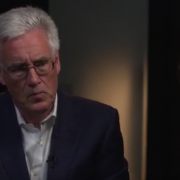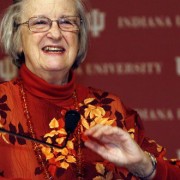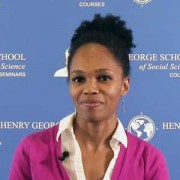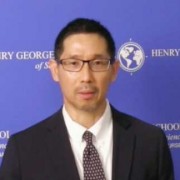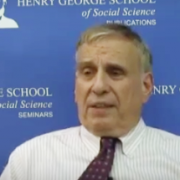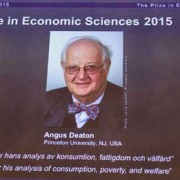Archive for year: 2015
The 13 women who transformed the world of economics
/in Uncategorized/by Admin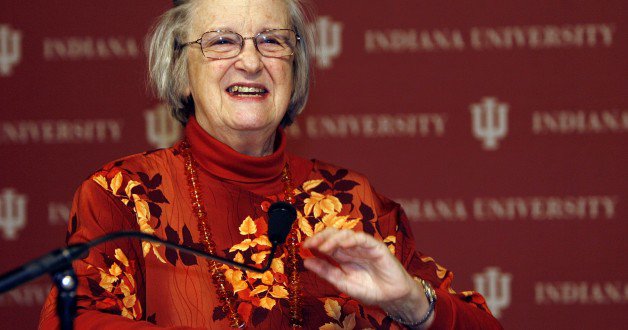
“A woman is like a tea bag; you never know how strong it is until it’s in hot water.”
― Eleanor Roosevelt
***
We decided to bring together some of the women who’ve had the biggest impact on the subject and the practice of economic policy, whether in academia, business, politics, or education.
These women are not just modern academic economists. Several are historical figures who made major contributions to the discipline at a time when female participation was incredibly difficult.
Take a look at 13 of the most influential.
…
We need a new trust-busting movement in America
/in Uncategorized/by Admin
Henry George was right then about opposing monopolies. He’s still right now.
****
Like immense amoebas on the prowl, America’s already huge corporations are combining like nobody’s business. In recent months, Walgreens bought Rite Aid, uniting two of the nation’s three largest drugstore chains; in beerland, Molson Coors is buying Miller ; mega-health insurers Aetna and Anthem, respectively, bought mega-health insurers Humana and Cigna ; Heinz bought Kraft, good news for those who take ketchup with their cheese; and American Airlines completed its absorption of US Airways, reducing the number of major U.S. airlines to four, which now control 70 percent of the air travel market. On Wall Street, the five biggest commercial banks hold nearly half of the nation’s bank assets; in 1990, the five biggest held just 10 percent.
Retailers that look to be rivals actually turn out to be brands of a single firm. A company called Luxottica owns LensCrafters, Pearle Vision, Sunglass Hut, Sears Optical and Target Optical. Online shoppers for flights and hotels may be less than thrilled to learn that once the Expedia-Orbitz merger is completed, the combined company and Priceline will control all the online vendors. Hyatt is considering buying Starwood, itself the owner of the Sheraton, W and St. Regis brands.
…
Africa Rising – the Quest for Economic and Social Development and Inclusive Economies
/in Uncategorized/by AdminSanford Ikeda on Jane Jacobs’ and Henry George’s Views of Progress and Poverty
/in Uncategorized/by AdminEconomics: The Nobel prize goes to Angus Deaton
/in Uncategorized/by Admin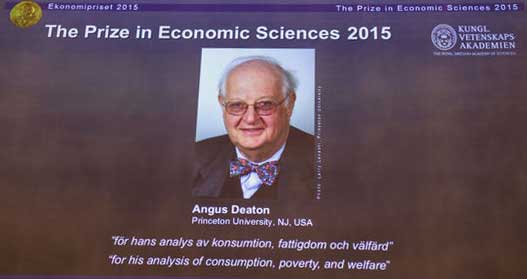
ANGUS DEATON has been named the winner of this year’s Sveriges Riksbank prize in economic sciences in memory of Alfred Nobel. Mr Deaton is a Britain-born economist (Scotland, to be specific), who earned his PhD in economics at Cambridge University before moving to America; he is now at Princeton University. Mr Deaton is best known for his work on consumption theory, welfare and inequality.
The committee awarded him the honour “for his analysis of consumption, poverty, and welfare”. His work “linking detailed individual choices and aggregate outcomes” was praised for having helped to “transform the fields of microeconomics, macroeconomics, and development economics”. According to the Royal Swedish Academy of Sciences’s website, his work has helped to provide answers for three big questions in economics:
“How do consumers distribute their spending among different goods? Answering this question is not only necessary for explaining and forecasting actual consumption patterns, but also crucial in evaluating how policy reforms, like changes in consumption taxes, affect the welfare of different groups. In his early work around 1980, Deaton developed the Almost Ideal Demand System—a flexible, yet simple, way of estimating how the demand for each good depends on the prices of all goods and on individual incomes. His approach and its later modifications are now standard tools, both in academia and in practical policy evaluation…
China shifts taxes to Land
/in Uncategorized/by Admin
Abstract:
China just made a major move to change the way it taxes its people, and this will have a major impact on both its growth and sustainability. According to Canada’s The Globe and Mail: “China [is] moving quickly to roll out property taxes nationwide”…
The Four Vampires of Capital
/in Uncategorized/by Admin
Abstract:
Employers are laying off workers for want of working capital. What happened to all that capital? Think of it as the coursing bloodstream of economic life, a metaphor used by Francois Quesnay, 18th-Century physician and land-tax champion who also pioneered an early macro- economics…
Visit Henry George School’s YouTube Channel
/in Uncategorized/by AdminNYC Office
149 East 38th St., New York, NY 10016
Phone: (212) 889-8020
Fax: (212) 367-0940
Email: info@hgsss.org
Office Hours: 9:00 AM - 5:00 PM ET
Contact Us
Code of Conduct
The Henry George School of Social Science admits students of any race, color, national or ethnic origin, age, gender or sexual orientation. The programs and activities of the School are available to all students on an equal basis.

